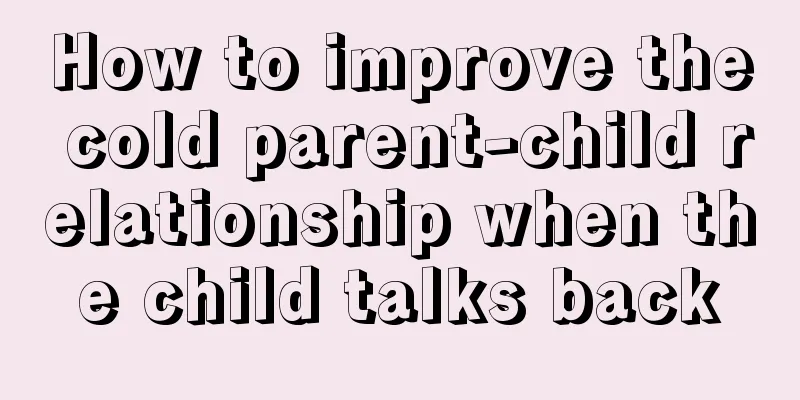What to do if your baby stutters? What is the reason for your baby stuttering?

|
When babies are learning to speak, they have a strong desire to express themselves. Some babies stutter when they are speaking. Parents are particularly worried about stuttering, fearing that their babies will still have this problem when they grow up. Today, let's talk about what to do if your baby stutters. What to do if your baby stutters1 | Why do babies stutter? Stuttering refers to the repetition of sounds, words or phrases. Stuttering is very common in babies. According to statistics, 5% of children between the ages of 2.5 and 5 have stuttering problems. During the period of learning to speak, the baby's language ability will rise and fall, sometimes fluent and sometimes not! Sometimes stuttering occurs for no reason; but most of the time, stuttering is often because the baby is too excited, too tired or too eager to express himself! During this stage, babies are constantly expanding their vocabulary and learning more complex language patterns. These complex language rules require babies to change from using single sentences, such as "Mom, eat milk", to longer and more complex sentences, such as "Mom, put the juice in the blue cup", which requires more coordination to complete smoothly. Therefore, it is inevitable that some confusion will easily occur in this process, and "stuttering" will occur. In most cases, the stuttering phenomenon mentioned above will disappear naturally as the baby grows older. However, sometimes stuttering is an abnormal situation. If it is abnormal stuttering, the earlier the professional intervention, the better the correction! Therefore, for us mothers, the key is to judge what is "normal" stuttering and what is "abnormal" stuttering that needs to be vigilant! 2 | How to judge "abnormal" stuttering The following table can help mothers roughly determine what is "normal" stuttering and what is "abnormal": If you have any of the symptoms on the right side of the picture above, especially if there is a family history of stuttering, you should pay special attention and seek professional help in time. In addition, in the infant stage, the probability of boys stuttering is twice that of girls. In elementary school, the probability of boys stuttering is 3-4 times that of girls. 3 | What can parents do? Normal stuttering is a normal developmental condition and will disappear naturally. Therefore, the most important thing for us parents is to identify whether the baby has "abnormal stuttering" as early as possible! Because abnormal stuttering after the age of 7 is almost impossible to completely cure! (Of course, through professional training and correction, stuttering can be limited to the greatest extent, even to almost completely normal; but even so, it cannot be cured). In addition, whether it is normal or abnormal stuttering, parents should also do the following: Reduce the pressure of communication. There are many conversation skills that can reduce the pressure on babies when communicating with them. For example, use this sentence: "You must have had a lot of fun at school today" instead of "What did you do at school today?" The former will put much less pressure on children. Use these conversation skills to minimize the triggering of stuttering in babies. Do not avoid the issue of stuttering. If the child is aware that he or she stutters, parents can talk about it with the child in an open manner. Of course, if the child is not aware of the problem of stuttering, there is no need to take the initiative to discuss it. Instead, take the child to see a professional doctor. Be patient. Do not interrupt your child. Do not interrupt your child by saying, "Take your time to speak," or "Think about it first" when your child is speaking. Be patient and wait for your child to speak on his or her own. Establish good language patterns by example. It is generally not helpful to tell your child how to speak. You can only guide them by speaking like this yourself. So you should establish good language patterns when you speak. For example, speak slowly, pause between sentences, speak in a relaxed manner, etc. Seek professional medical help. Take stuttering seriously. If you suspect your baby has "abnormal stuttering," seek professional help in time to correct it as soon as possible. Manifestations of stutteringStuttering can manifest in many forms, and is usually divided into three categories in medicine: first-word difficulty, word repetition, and sentence interruption. 96% of stuttering manifests as first-word difficulty. Most children only have speech symptoms in the early stages, while some severe patients may have various accompanying movements due to physiological tension, such as lip, jaw, and neck muscle spasms, tongue muscle tremors, stomping, blinking, and turning heads. At this time, factors such as parents' attitudes, social frustration, and mental stress can cause stuttering to worsen and increase accompanying movements. 1. Difficulty pronouncing the first word: the first word cannot be pronounced, the first word is repeated, and a word in the middle of the sentence is difficult to pronounce; 2. Word repetition: frequent repetition or extension of speech or syllables, affecting the fluency of speech; 3. No obstacles to the expression of content; due to the tension spasm of the pronunciation-respiratory organs, the language rhythm is disordered 4. Exclude tics and other neurological diseases. When children speak, they may stomp their feet, wave their hands, squint, twist their mouths, tremble their lips, shake their trunks, etc. Some children are easily excited or irritated, and have emotional instability and sleep disorders. As they grow older, children may also develop anxiety, shyness, irritability, unwillingness to participate in group activities, fear of speaking in class, dislike of socializing, and become lonely and withdrawn, among other emotional and behavioral abnormalities. If not corrected, this may eventually lead to persistent stuttering. Preventing stuttering in childrenIn order to prevent children from stuttering, it is important to arrange their daily life and cultivate good hygiene habits. Children should have a regular daily life, eat at regular times, and get enough sleep and rest. Do not force children aged 3 to 7 to memorize long stories or poems that are not suitable for their language ability. The key to correcting children's stuttering is to cultivate a good speaking habit. For children with stuttering, parents and teachers should patiently teach them how to speak clearly and how to express their ideas correctly. If they speak correctly, they should be encouraged to "speak well" and help them build confidence in learning and mastering speaking skills. If they speak unclearly or unfluently, they should also listen patiently and not interrupt or scold them casually, so that the children will not dare to speak in front of others in the future, or become nervous and stutter when they speak. Music can play a good role in correcting children's stuttering. Rhythmic singing and recitation are helpful for children's language training. After listening to music, children are in a good mood and distract their attention from speaking, not just focusing on the action of speaking. In this way, it is easy for children to say what they want to say. Storytelling is also a way to help children correct stuttering. Parents can let their children narrate things in kindergarten and school; talk to their children about new books and new TV series. It should be noted that parents and teachers should be patient and require children with stuttering to be calm and not in a hurry. Each time should not be too long, as it is easy to make children with stuttering feel mentally tired. Generally, 20 to 30 minutes is enough. Parents or school and kindergarten teachers should give children with stuttering warmth and help in many aspects, and people around them should not tease, laugh at or deliberately imitate children's stuttering. |
<<: How often should babies be fed with formula? How often should babies fed with formula eat?
>>: Does hair dyeing affect pregnancy? What effects does hair dyeing have on pregnant women?
Recommend
Can I use a facial mask during confinement? What brand of facial mask is good for breastfeeding?
Applying facial masks has always been a very popu...
Can babies eat salmon? What are the benefits of eating salmon for babies?
Salmon is very nutritious and babies can eat it i...
Can pregnant women eat Mars fruit? What are the benefits of eating Mars fruit for pregnant women?
Eating fruits during pregnancy can supplement the...
Can children drink milk when they vomit? What medicine can children take when they vomit?
Vomiting in children is a relatively normal pheno...
Is toothpaste acidic or alkaline? Is toothpaste with fluoride or without fluoride better?
We all need to brush our teeth every day, so we n...
The most effective way to reduce belly fat after childbirth What to eat to reduce belly fat after childbirth
A firm, flat and curvy belly is what all girls wa...
Can red bean water help pregnancy? Red beans can regulate your physical condition.
2015 is coming to an end, and the Lunar New Year ...
Can Yunnan Baiyao toothpaste relieve toothache? Which Yunnan Baiyao toothpaste is the best?
Yunnan Baiyao toothpaste is a medicinal toothpast...
Can babies eat bamboo leaves? Can babies eat bamboo leaves?
Can babies eat bamboo leaf vegetables? Green vege...
How many grams does one spoon of Abbott milk powder weigh? How to prepare Abbott milk powder?
Different milk powders have different scoops of g...
How can parents teach their children to respect others?
When babies grow up, they may show disrespect to ...
Will sex hurt after giving birth? Will women's sexual desire increase after giving birth?
After giving birth, a woman's body has been t...
Can pregnant women take stomach medicine during pregnancy?
The health of prospective parents is very importa...
How much milk does a baby drink in one month
Babies need to supplement nutrition during their ...
Can I cut my hair after a miscarriage? How long after a miscarriage can I cut my hair?
After a miscarriage, you will be unkempt and your...









